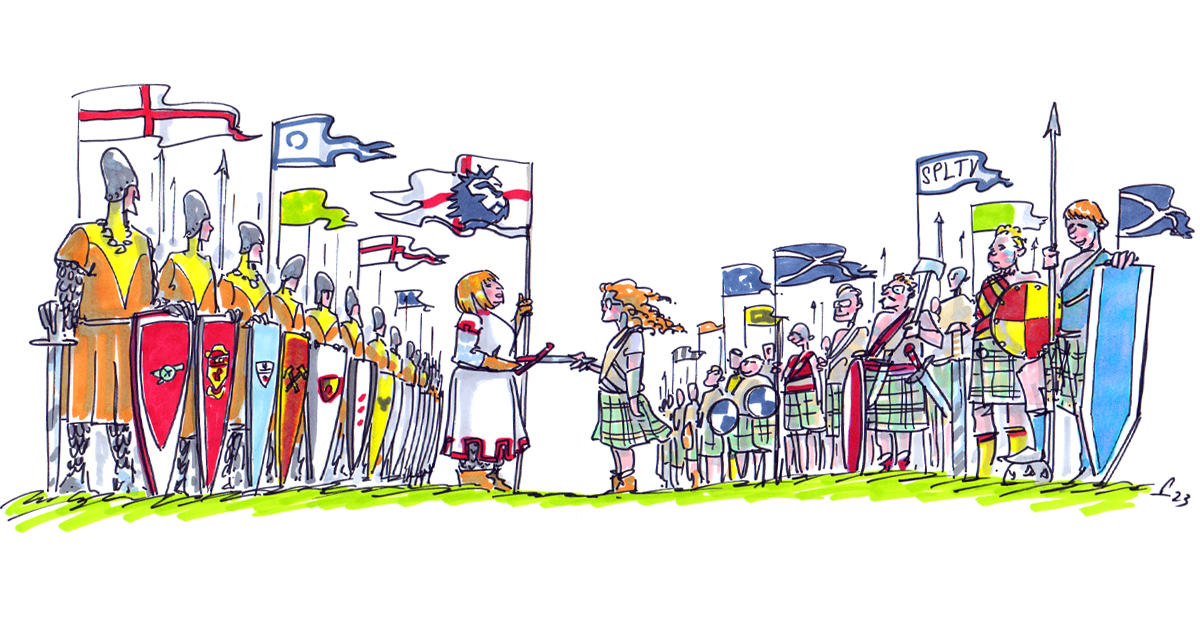Does sport have the belief and bravery to do the owned channel? And, arguably, the brains to still say no?
A friend this week sent me this article on the “EPL ready to ditch Sky for their own DTC” narrative.
Simon Jordan makes it seem such an easy choice. He has never run a sports league, and he is wrong for many reasons. But here is the best one:
Trying to create an asset of equity value in a league of changing shareholders with promotion and relegation is the Charge of the Light Brigade, especially when your clubs just want safe money up front.
The majority of people rightly commented on how these stories always surface as the rights re-negotiation period begins!!! Just a bargaining ploy, like we’ve seen many times before.
But not many of these commentators have really seen it before; not from the actual inside. With the SPLTV, worked up with Marc Watson in 2002, I was “the inside”.
B2C, DTC, owned media, is a topic well discussed in our industry. But I feel that the better commentary on all this is how it fits into the overall macro thinking of sport we’ve discussed in this column in recent weeks. We need to all start joining these dots.
1. Integrated storytelling
(with a sport in charge of its own narrative, that isn’t fragmented)
Sport’s storytelling is Jackanory
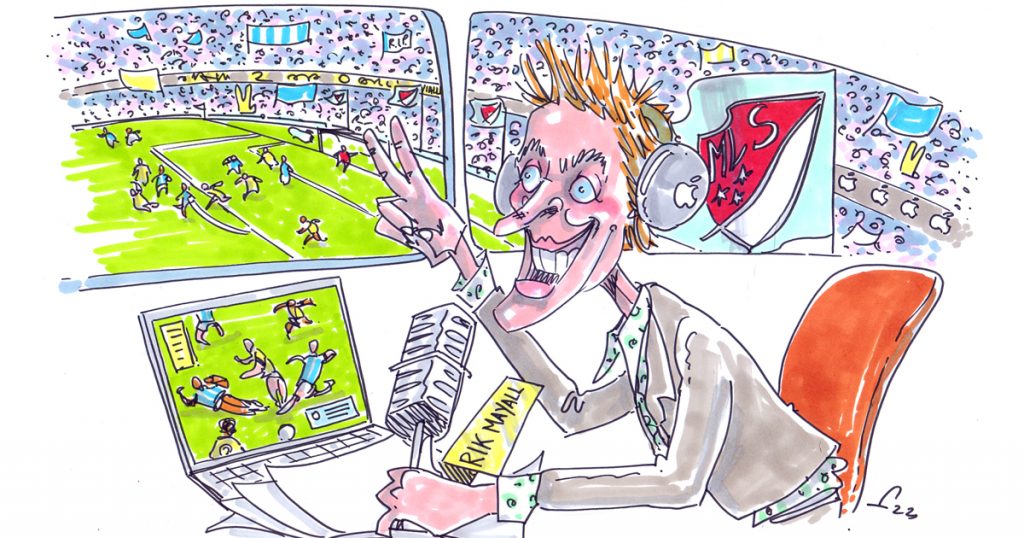
2. Sports’ original Sin of B2B short-termism
Sport’s original sin: the B2B apple
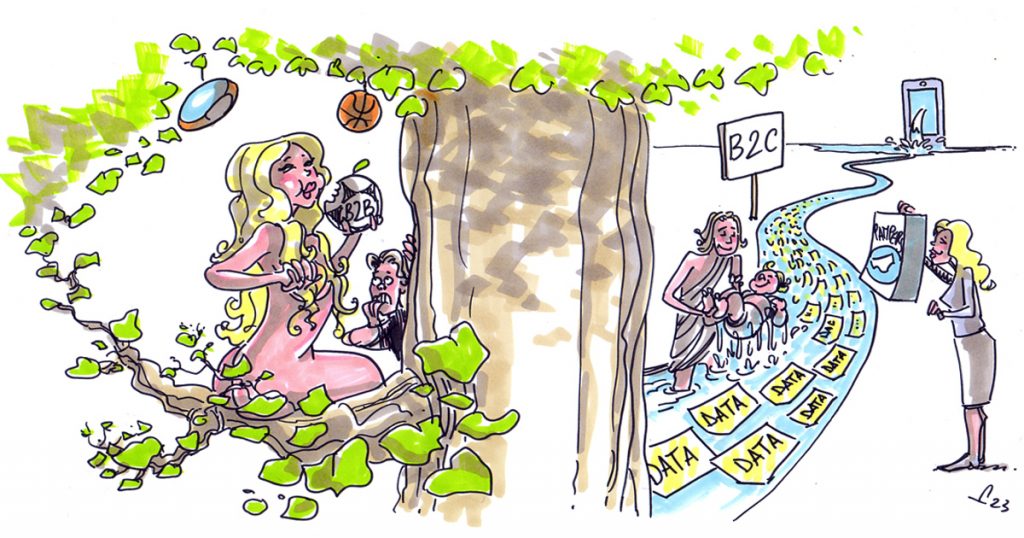
3. Approaching sport with realistic open-eyed risk assessment
(especially around the direction of travel in sports rights valuations)
European football is underpriced risk
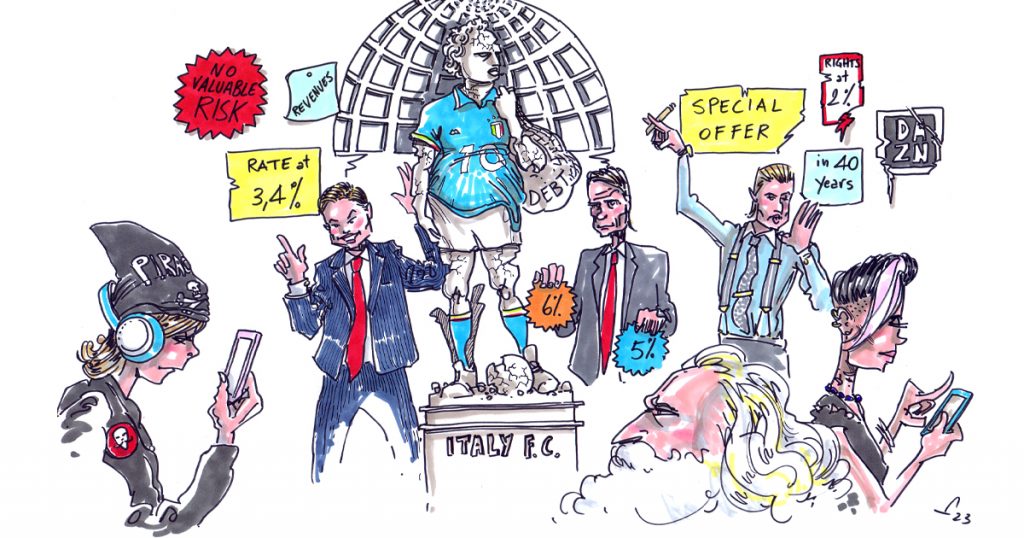
4. The changing product market fit for sport
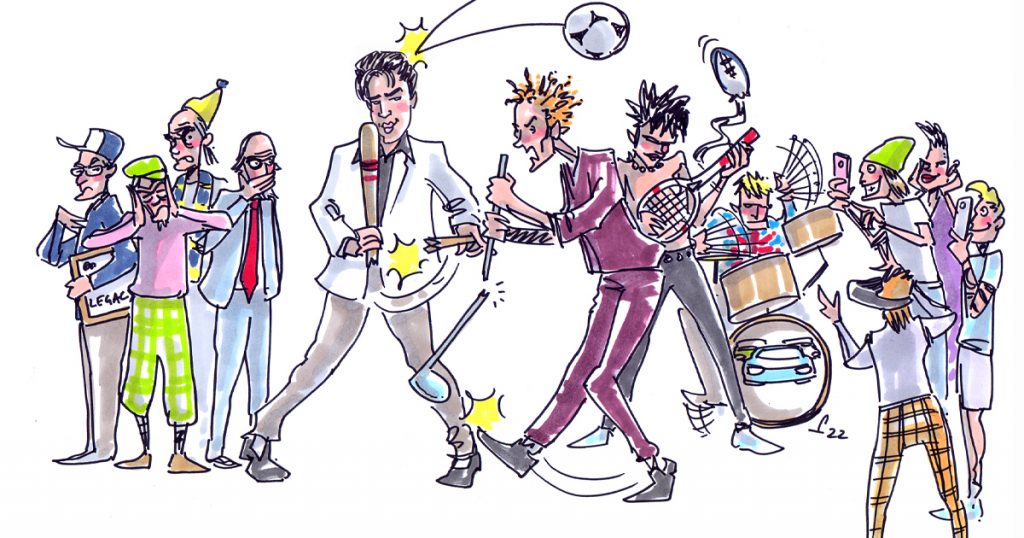
5. I’d add in the AYNE GOG discussion on the recent plans of the EFL
(to sell all its games and end the closed period)
Where and how does it all come together, and where does the DTC channel sit at the end?
All of us are perhaps guilty of talking about these themes in isolation, when of course the real added-value insight is in seeing how they all connect. Because they all do. They are all part of these increasingly choppy waters of sportsbiz, where we would do well to take time to plot a sensible route to shore, after surveying all the stars in the sky.
I personally have my own very nuanced and conflicting views on the future of sport. Torn back and forth every day.
I have put a lot of opinions out there in the last five years. Most of them, I think, have been correct; but now, what’s the bottom line? The famous Jack Welsh one-page summary.
Football is going in the wrong direction.
My major thesis today, in 2023, is that football is going very much in the wrong direction, throwing far too many games into the market. It’s oversaturated, just like how the excessive licensing of a Pierre Cardin, Gucci or YSL nearly killed those brands. I wrote about this principle of scarcity here: Albachiara | Ode to Pete Rozelle
The article discusses how the NFL’s “less-is-more approach” is the correct strategy for sport. I’m feeling a lot of pessimism around the oversupply of too many games, killing the uniqueness, thrill, and brand of the product, whilst crippling athletes. I also think that the fragmented windowing of rights across so many broadcasters is confusing the tight narrative of sport; with too many storytellers.
Both of these errors are because rights holders and their CEOs still have one aim: to maximise upfront revenues, and to hell with the brand, the messaging, and the fan value-for-money.
So many think, like Simon Jordan, that a league channel could be the B2C way forward, with massive upside.
Here is my personal story of seriously trying to deliver a League Channel.
All events and personalities have every similarity with real people and real events. Names are exact.
21 years ago, the Scottish Premier League went down a road called SPLTV. The catalyst was not heroic. It was, simply, because in 2002 the media sector was on its back, after the dot-com bust and 9/11. BskyB was the only game left in town, and it rightly took advantage. Sky had bid £12m in 2002 for the SPL: no increase on the previous rights cycle of 1998. Independent work done by Mark Oliver had shown that the value of the underlying game assets of the SPL could have aspired to £50-60m pa. To be fair to the superb Mr Oliver, he had done this 12 months previous, at the height of the ITV Digital, NTL, 3G frenzy.
Timing is everything.
Timing is everything, and this is exactly why I am so reticent to believe in today’s lazy “up-and-to-the-right” thinking on sports rights. You’ll be sorry. Black swans abound. Markets change.
Rights tendering mainly was, and still is, about timing, and competitor pressures. Don’t let anyone tell you it’s more sophisticated. Ergo, if there is no competitor, you are in trouble, and in 2002, all rights holders were in trouble. I would argue, for example, that this is exactly where SerieA is today.
Back in 2002, however, my clubs couldn’t un-see Mark Oliver’s valuation numbers. They told me to forcibly reject the Sky bid. They then asked for options, and that is when the SPLTV concept was born.
If Sky had bid fully, as they would have 12 months earlier, SPLTV would never have been conceived. We did it, coz we had to.
Building the SPLTV.
I knew nothing about putting up your own channel, but Marc Watson, our advisor, did.
I wonder, what did Marc ever make of himself in this sector?
We put together the business plan, and the operational structure. We did a beauty parade for all the outsourced services, from subscription management, to production, marketing, to programming creative. They all traipsed up to Glasgow to pitch in a who’s who of the sports sector. No one thought we were bluffing.
The thing about beauty parades is that you hear everyone’s great ideas. That firms up your own view of what can happen. No one is a genius in their own right. The best creators, artists and operators use their ears, and scrape (plagiarise) the best IP. From Bowie to Raffaello.
Scottish football’s problem.
Many of those pitches revealed that the problem with Scottish football was its narrative, far too restricted to the Old Firm culture war antagonism. As a result, so many great stories of passion and local community, of the glorious history of the Scottish Professors of the English Game were being ignored.
I loved that thought. Don’t just show Celtic and Rangers games. Sell, on the contrary, an entire historical novel, brought bang up to date, based on the crazy soap opera of fandom.
A couple of Hollywood folks would do something similar in Wales a generation later, to prove the viability of that exact point.
A Channel needs a full schedule of programming.
Someone then tells me that you have an entire week of programming to fill, and you’ll need more sports rights. Before you know it, the SPLTV plan involves buying the SFA rights to Cups and the national team. Why don’t we then look for other rights that are undervalued? And it’s a mini Dazn or Eleven.
The techies then tell you that once you’ve proven the concept of this delivery platform, you can sell it to other rights holders as a service provider. The MLB did exactly that later with Bamtech.
I personally had few of these ideas; they belonged to guys like Watson, Phil Lines (Granada), Bill Sinrich (IMG TWI), Alan Clements (Wark Clements).
It was a beautiful, beautiful project, where my role was merely to open my mind, recognise the vision of others, see that the numbers were rooted in reality. And, finally, sell it to my clubs.
Looking for votes.
As a league CEO or Commissioner, ultimately, you always need to get votes for your plans, as you, yourself, have no real power. You therefore start building your book. I needed 11 of my 12 clubs to agree to this. The EPL‘s 67% threshold was, in comparison, a wet dream for me. The SPL constitution was constructed with a built-in veto for Celtic and Rangers acting in unison.
How was I going to get clubs to vote for something where they would need to leave aside the old safe B2B money, in exchange for a media startup that had never been done before? A business model showing subscription revenues only as sure as what the market research and due diligence had told us? “Risky” can never ever do justice to that pitch I was asking them to approve. How to price that risk? What discount rate was I using in that 12-year DCF?
Under pressure.
You only get truly better when tested under pressure. I did a lot of growing up in 2002.
I had two advantages:
1. the clubs were angry at the lowball from Sky. “Insulting” – I was told to refer back to Vic Wakeling.
2. The second advantage was in pointing out very clearly to the clubs that Sky only wanted the Old Firm games, and had no interest in marketing every other single club. “Surely we can tell our own story better guys?”. That resonated.
Ps: Sky has only ever wanted the Celtic and Rangers games. To this day.
I started building my consensus.
John Boyle, maverick owner of Motherwell and major shareholder in Wark Clements. He was right up for it.
Chris Robinson, pugnacious owner of Hearts, always liked a knife fight.
Stewart Milne of Aberdeen, started as a sparky, to then build the biggest home builder in the UK. Very driven.
Then the clubs that always trusted me, regardless. Bill Costley of Kilmarnock and his hotel empire. Geoff Brown of St Johnstone, another big house builder. The Marr brothers, in Dundee, with Ivano Bonetti. Lord Haughey, owner of Livingston.
I had seven. Eight, with Dundee United, who – to be honest – just always went with the flow.
The cold money guys.
The advice I would give to any young person needing consensus: win over the hardest sceptic, because then they’ll be a zealot in your favour. If you turn them, they become your main asset.
Gavin Masterton, Managing Director of the Bank of Scotland PLC, and owner of Dunfermline, always believed in my SPL and gave his support immediately. I also knew he was the personal banker of Sir David Murray at Rangers and could maybe help when I needed to get his vote. I then went to Rod Petrie at Hibs, a hard-nosed investment banker. The plan needed to have the numbers and, therefore, I asked him to be my anti-Kool Aid guy. “Tell me this isn’t going to work, Rod”. He is a dry Edinburgh corporate finance guy, today president of the SFA. He was convinced.
I had 10 votes. I needed 11.
To this date, IMHO, the greatest achievement of my career was in getting all of these smaller clubs to drop the safety net of B2B cash upfront, and take their risk. But the reality was simply that this SPL league was full of magnificent entrepreneurs, who loved a challenge. I just showed them what today is called a vision pitch deck, and the bravery and faith were all theirs.
Timing is everything in life. Celtic PLC, especially, had become very public in the media about how they saw it as “inevitable”: that they and Rangers would be playing in the EPL soon. Brian Quinn, their chairman, was also vice-chairman of the Bank of England, and carried gravitas when he spoke in the FT, as he did with that quote.
Sir David Murray at Rangers was, well, David Murray. You never really knew 😉
Celtic and Rangers gave their apparent support to the SPLTV project each month for the next 6 months. We had fortnightly update status reports. The beauty parades. The clubs and their staffs were a massive help to us at the centre. It was 6 months of green lights and shoulders to the wheels. A great time.
Choosing the business partners.
We chose our partners. Worth mentioning a particular incident that is such a learning point. Sooner or later, if you get senior, you are going to run into a Logan Roy type. A hard man. who doesn’t have much time for your feelings or pronouns, or even your “mental health”. They are proactively looking to bully you, test you. Alpha male stuff.
If you don’t like that idea, get out now. Go stack shelves in Lidl.
The last two bidders for the SPLTV production gig were IMG and Granada. The cream. Bill Sinrich with the former had cleverly aligned with local partner Wark Clements. My clubs, nevertheless, decided for Granada, but wanted Wark Clements in our team. I was told to rip them away from IMG and get them to partner with Granada. Not the most ethical thing to do. Alan Clements wasn’t happy either. It is here that a young exec learns how hardball business really is! So I did this for my clubs (shit, I had run them up to the top of the hill and wasn’t going to go all boy scout at the 11th hour). I then had to explain to Sinrich that he had lost, inventing some lame reason. He knew exactly what had happened, and let me have the most aggressive barrage of personal abuse I’ve ever experienced. I tried to deflect, but we both knew that he was right and it was very fair. I just took it. Bill was a fierce and formidable man, and the sports industry lost a giant of a pro when he died.
The epilogue.
May 2002 arrives, 12 weeks before the new season. The whole 6-month project is complete. The clubs were up for the risk.
At the meeting to sign all the contracts, Rangers and Celtic declared that they would NOT be approving. They cited doubts.
The vote didn’t pass. 83% of my clubs had had the vision and courage. Tragically, however, the league threshold for approval was 92%!!! The 10 clubs in favour resigned from the SPL in fury, with a public statement on the steps of the stadium slamming Celtic and Rangers.
The project died there and then, that morning, at Hampden. So did the SPL and, for me, so did Scottish football really. It has never recovered, and now is irrelevant in the wider context of rights holders.
A missed opportunity to lead change.
Scottish football missed the opportunity to lead the sports broadcast world, and that is no exaggeration. It was the equivalent of the Don Masson penalty miss against Peru in 1978. To continue the metaphor, it was the Dutch who later twisted the knife, when nearly 10 years later this model was copied successfully by the Dutch league and Fox.
I was told to go back to Sky and get the best deal. Vic Wakeling was magnanimous in his victory and in his office turned around his PC to show me our entire plan, and workings.
“You never stood a chance Rog”, as he dragged on the ciggie. I gasped. Business is indeed hardball.
Maybe that glorious old Yorkshireman was right. Getting, and holding, a consensus of clubs is an impossible task with so much at stake. Maybe the Old Firm had never had any intention to commit to Scottish football for so long, and were surprised I got so far, in what they hoped was a tactic for Sky.
Regrets.
Not a week passes when I don’t regret this, without someone asking me about this period. Every time the new Scottish SPFL league does a bog-standard rights deal with SKY, it is always criticised on scope and values. I’m asked to give a nasty sound bite, to twist the knife. But I never do, because it’s not right. Here is the defence of Neil Doncaster, the League’s Chief for these last 15 years.
- The quality of owner at the SPFL now isn’t anywhere near as visionary and brave as in my days. It’s always about people at the end of the day.
- The project requires long term buy-in from Celtic and Rangers and they have never had any commitment to Scottish football. They will be off on the first train down South, when it arrives. You can’t build a start-up when the main founders are still sending off CVs to Google.
- The sub numbers, now under piracy, are maybe not big enough to justify the risk. Add in how GenZ isn’t interested in 90 minutes so much, and has no DNA in paying for content.
It’s not a slam-dunk as it was in 2002. When James Tree of IMG revisited SPLTV in 2010, it didn’t get out the blocks. I asked James, one of the Como 50, about his experience after mine, 8 years earlier.
For me there is an inevitability to it and I hope it works. But my concern lies in the system, not the concept.
Multiple stakeholders and the reluctance for clubs to fully collaborate is an issue I’ve seen countless times. It will become a discussion about each teams’ fans; how many they bring to the table; their tickets, their merchandise, their retail deal etc. etc. etc.. And, then, how that contributes to them getting more of the revenue distribution in their favour.
If they get past that hurdle, the next one will be the reaction to the marketing and production costs needed to retain customers. And what is spent seeking new ones. Clubs will drag their feet that everything is fine and they don’t need to worry about these costs. They can save a couple million, because they need a new left back. The challenge really lies in the need for guaranteed cash and fixed revenue to operate, with the ability to borrow at favourable rates. So, in my opinion, there will always be a middle man to financially take the risk.”
James knows the reality of Leagues in Europe. It’s a Mors Tua Vita Mea mentality. The total opposite of what’s needed to collaborate, as one, on a League project like a Channel. Add in the complexity of equity stakes, getting valued when transferred from relegated to promoted clubs.
It’s so much simpler to let that middle man take the risk, even if you know that you are leaving a lot on the table.
In conclusion, is the EPL’s own-channel news another false start? Just the bargaining chip?
You know, I don’t think so, this time. This may be real, despite everything. That League is very smart and understands vertical integration. Capturing more of the value chain and its economics. Taking “rent” out of each part of the process. Getting the first party data and, maybe, capturing the Holy Grail of a rerating as a B2C company. They also know you need to sell a better experience than merely a video stream. Modern fan consumption is aggregating activity: “doing not viewing”. You can’t pirate activity, like you can a simple video stream.
The truth will out… it always does.
I wonder if they are speaking to Ant Arena?
Listen to our “Are you not entertained?” sports management podcast here.
Let us also recommend our wonderful colleague John WallStreet. His daily newsletter here is essential reading, especially in its coverage of the US market. For lovers of sports data, this is a great read.
To find out what we do in change management, have a look here.
For our C-suite management services, read here.
Here you can know more about our content development work.
Discover our Corporate Learning service.
Get to know more our “Sport Summit Como” yearly sports management event here.
If you are interested in our own story, check us out here.


